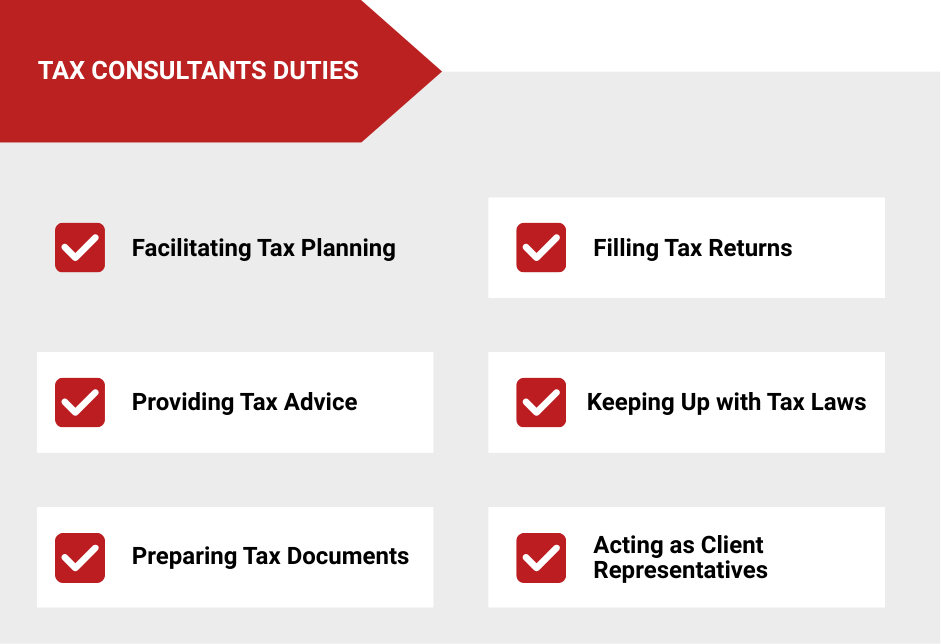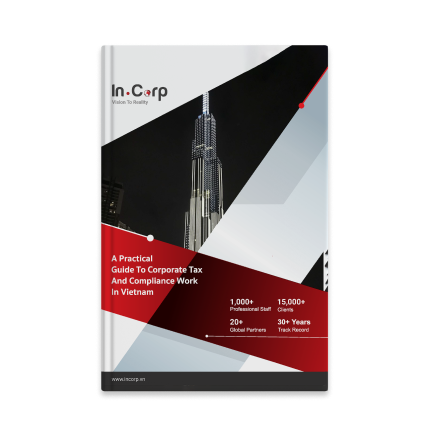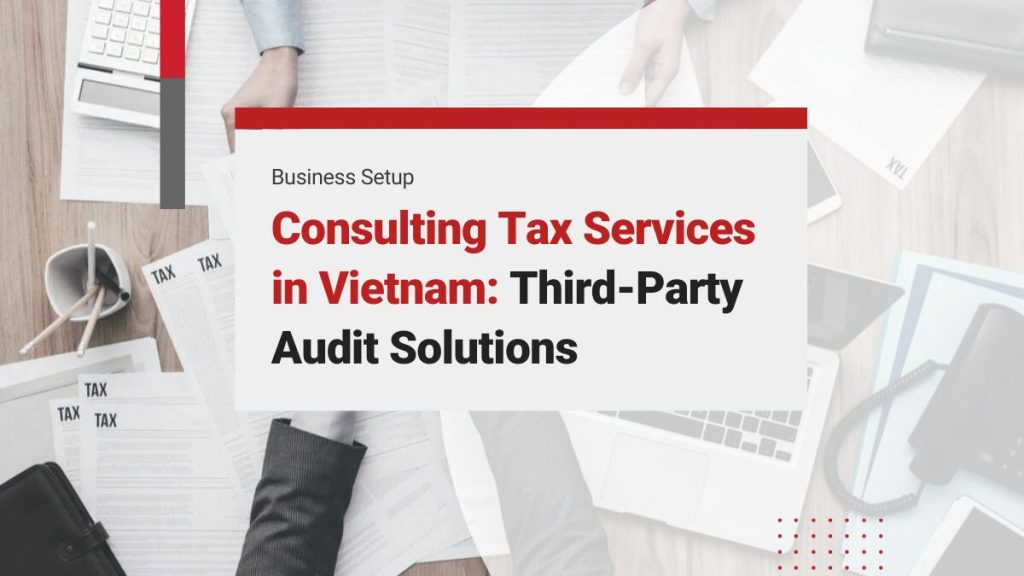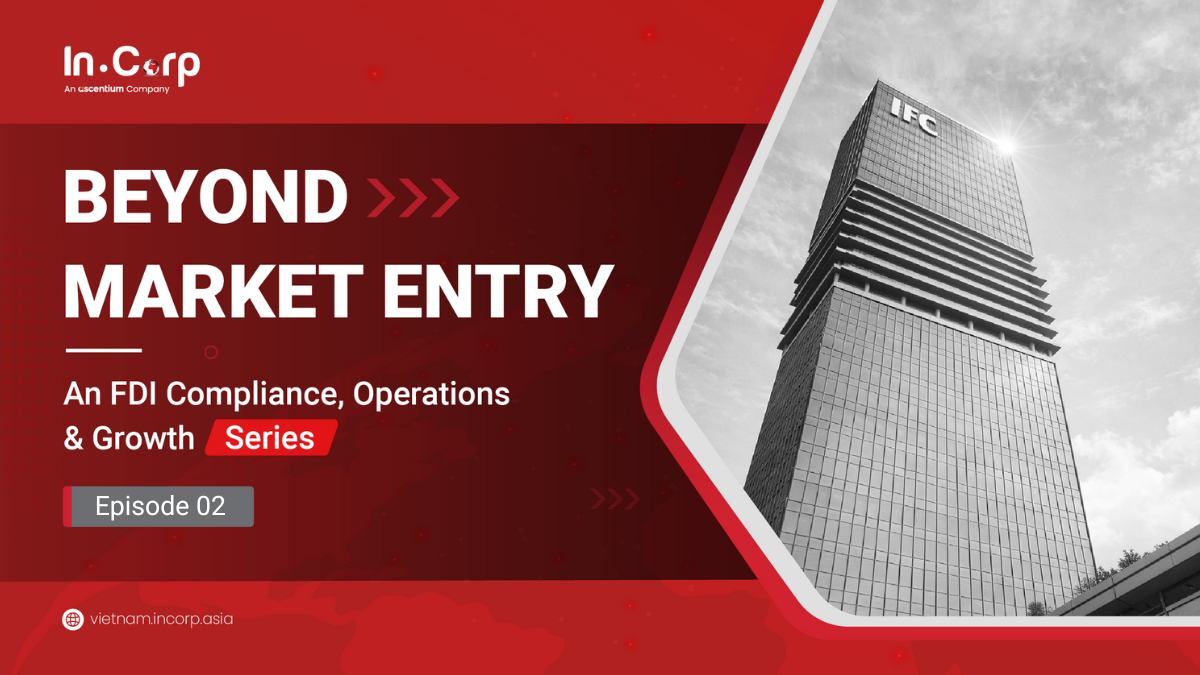In Vietnam’s rapidly evolving economy, taxes are among the largest controllable cost elements for businesses. As tax laws constantly change, companies increasingly seek expert tax consulting to minimize their tax burdens while staying compliant. Expert tax advisors serve not just foreign-invested firms but also limited liability companies, joint-stock companies and SMEs.
According to Jack Nguyen, CEO of InCorp Vietnam, “a local consulting tax partner can ensure your filings are accurate, help you claim every legitimate incentive, and prevent avoidable penalties.” This aligns with a foreign-investor guide that emphasizes while hiring a tax agent isn’t mandatory, “it is highly recommended” in Vietnam—for precisely these reasons.
Looking for Tax Consultant Outsourcing in Vietnam? Check out InCorp Vietnam’s Third-party Audit & Tax Advisory Services
What Services Do Tax Consultants Provide?

Tax consultants (or tax advisors) offer a multifaceted suite of services beyond basic form-filling. They first diagnose the client’s situation – reviewing revenue, expenses, investments and long-term plans – to identify tax-saving opportunities. They closely monitor changes in laws (e.g. VAT adjustments, corporate tax incentives, transfer pricing rules) and interpret how those changes affect each client. Within these legal bounds, consultants structure and plan proactively: for example, advising on the optimal timing of income or deductions, leveraging tax incentives, or arranging cross-border transactions to be tax-efficient.
They also handle compliance and reporting – preparing and filing all required returns (CIT, VAT, PIT, withholding taxes, etc.) accurately and on time – to avoid errors and fines. In case of disputes, tax consultants represent the company in audits or appeals, drafting responses and negotiating on the company’s behalf. Finally, they conduct periodic “tax health checks” by reviewing past returns and uncovering overlooked deductions or compliance gaps for voluntary correction.
In practice, a tax consultant’s day might include preparing complex returns, advising on deductible expenses, and liaising with tax authorities. For example, one expert summary notes that consultants often “prepare and examine various tax returns” (individual, corporate, VAT, payroll, etc.), “provide strategic advice” to minimize liabilities (by leveraging credits and deductions), and even represent clients during audits or appeals. They stay abreast of law changes (e.g. by consulting the tax code or attending seminars) and counsel clients on implications for business strategy. By combining compliance with proactive planning, tax consultants become true business partners.
Advantages of Engaging a Tax Consultant
Engaging a specialized tax consultant brings concrete benefits:
- Maximized Savings: An expert consultant uncovers deductions, credits and incentives that non-specialists might miss. For instance, professional advisors can streamline tax processes and identify potential savings, ensuring you pay only what is required under the law. They know the latest rules (for R&D, investment incentives, or charitable contributions, for example) that boost refunds or cut liabilities.
- Error Reduction and Audit Support: Seasoned consultants catch mistakes early. By carefully reviewing calculations and supporting documents, they reduce the risk of errors that could trigger penalties. If a tax authority does audit, your consultant can defend the return: as one CPA firm notes, consultants not only prepare returns but also “reduce the likelihood of an IRS audit” and can represent clients during audits. Having an advisor at your side provides peace of mind and a responsive strategy if disputes arise.
- Strategic Planning: Beyond filing, consultants provide high-level advice on business decisions. For example, they analyze the tax impact of reorganizations, capital investments or compensation plans so that you can “minimize tax liability” when making strategic choices. They also project how future legislation may affect you and help you adapt – for instance, preparing for the comprehensive 2025 tax reform in Vietnam. This forward-looking planning guards against surprises and aligns your tax strategy with your business goals.
- Compliance Confidence: With complex Vietnamese regulations and stiff penalties for late or incorrect filings, a consultant provides regulatory assurance. They ensure all filings meet the latest requirements (as InCorp stresses, “ensuring compliance” is a core service). By keeping meticulous records and providing an organized audit trail, they help you satisfy government audits or inquiries.
- Time and Resource Savings: Tax matters can be daunting for busy managers. A consultant handles time-consuming tasks (document gathering, return preparation, correspondence), freeing your team to focus on core operations. For smaller firms or startups lacking in-house tax expertise, this support is especially valuable. As one advisor summary notes, consultants can assist in figuring out tax liability and ensure compliance with tax laws, which is “especially beneficial” when entrepreneurs lack the time or expertise for complex tax issues.
Overall, the intangible benefits – expert insight, certainty of compliance, and better use of cash flow – often outweigh the fees paid to the consultant.
What is the Cost of Hiring a Tax Consultant?
In Vietnam, fees for consulting tax services can likewise span a broad spectrum depending on complexity, language, and the depth of support. According to publicly posted pricing from service providers: basic tax consulting in Vietnamese may begin at around 600,000 VND per hour, while consulting in English often starts from about 1,000,000 VND per hour. For corporate clients, routine quarterly filing packages (tax + accounting) typically range from 1,500,000 VND to 4,800,000 VND per quarter, depending on invoice volume, industry, and whether import/export declarations are involved. Annual closing or tax finalization services might start from approximately 3,500,000 VND/year for simpler businesses. Meanwhile, full “tax + accounting” packages (covering monthly bookkeeping, filing, advisory) may begin at around 1,000,000 VND/month for small entities.
These amounts illustrate that, as in other markets, simple compliance tasks tend to fall in the lower thousands of VND, while deeper advisory, restructuring, or audit-support work may command much higher fees.
Several factors influence the cost:
– Scope of Service: Do you need only return preparation, or also strategic planning and audit support? More comprehensive services (like quarterly filings, tax modeling, or cross-border advice) command higher fees.
– Expertise Required: Consultants with niche skills (e.g. transfer pricing, international tax) or premium credentials (Big 4 experience, CPA/EA licenses) often charge more.
– Business Complexity: Multistate operations, multiple entities, or significant transactions increase workload (and thus cost).
– Delivery Mode: Remote (online) advisors can undercut traditional firms. For example, simple online tax tools might start around US$50–150 for basic filings, but they lack personalized analysis. Conversely, onsite or dedicated services give face-to-face access and rapid on-demand support, at a premium.
Given this variability, businesses should assess their needs carefully. Often consultants offer packages (e.g. flat annual fees for all filings) or hybrid billing (base fee plus hourly for special projects) to give pricing predictability. In any case, the investment should be weighed against potential tax savings and risk avoidance.
Virtual Tax Consulting and Outsourcing
In recent years, many Vietnamese companies have embraced outsourcing their tax functions to third-party experts. This can mean everything from hiring a consultant on retainer to outsourcing bookkeeping and tax filings entirely. The benefits are significant: specialized firms like InCorp Vietnam combine tax advisory with accounting and audit support, providing one-stop solutions.
Virtual consultants (who operate entirely online) are particularly popular for quick answers and lower rates; for businesses with simple needs, this model can save anywhere from a few dozen to a few hundred dollars compared to in-person service. However, purely remote consultants lack on-site presence, so companies often balance convenience against the need for occasional face-to-face meetings (for example during audits or strategic planning sessions). Some firms offer “mixed” models with regular online service plus occasional office visits.
Outsourcing also lets a small business leverage a team instead of relying on one in-house individual. For foreign companies, local firms bring language and regulatory knowledge that solo expats or distant branches often lack. Importantly, reputable providers handle all local registration and compliance (e.g. registration with the General Department of Taxation portal), so clients can focus on operations. InCorp Vietnam’s tax services page highlights “comprehensive support” and a “simplified process” as key benefits of outsourcing all tax and compliance tasks.
Tax Consultant vs. Tax Preparer: What’s the Difference?
Before choosing a professional, it’s important to distinguish between a tax preparer and a tax consultant:
- Tax Preparer: This role is mostly transactional. A tax preparer completes and files tax forms (e.g. individual 1040s or basic corporate returns) based on provided financial data. Preparers often have limited training (sometimes just a short course) and focus on straightforward filings. They typically do not give much beyond form-filling guidance. As one firm notes, “A tax preparer is someone who files income tax forms for others” and is best for “simple tax situations, simple returns and relatively lower annual incomes”.
- Tax Consultant (Tax Advisor): A consultant provides a broader advisory service. In addition to preparing returns, they analyze your entire situation for tax efficiency. They help structure transactions, recommend timing strategies, advise on law changes, and can represent you in audits. Essentially, they wear more hats: strategist, interpreter, and negotiator. The same source explains that while both consultants and preparers can technically file returns, a consultant “typically provides many more services for their clients”, especially if complex planning is needed.
Credentials differ too: a tax consultant often has advanced qualifications. In practice, many consultants hold degrees in accounting, finance, law or related fields and are licensed professionals. In the U.S., many are CPAs or Enrolled Agents (EAs); indeed, one guide suggests that becoming an EA is common for consultants because it allows client representation before the IRS. Likewise, Vietnamese tax consultants typically have strong backgrounds – often an accounting or finance degree – and may hold the official Tax Procedure Service Practitioner Certificate or CPA licenses. (As discussed below, firms must employ certified practitioners to legally offer tax services.)
In summary, if your needs are routine (e.g. straightforward filings), a tax preparer may suffice. But for strategic advice, complex issues or risk management, a tax consultant is recommended. Their expertise can translate to bigger savings and fewer headaches when regulations change.
How to Choose the Right Tax Consultant
Selecting a consultant (or firm) is like any professional engagement: due diligence is key. Consider the following steps:
- Industry Experience: Ask whether the consultant has worked with clients similar to your business. For example, a manufacturing company has different tax issues (e.g. fixed asset depreciation, customs duties) than a software firm or a restaurant (which has special rules on tips and fringe benefits). A consultant with relevant industry experience will better understand your specific tax landscape.
- Qualifications and Skills: Verify credentials. In Vietnam, licensed tax professionals either hold a CPA (Certified Public Accountant) license, an EA, or the local tax practice certificate issued by the tax authority. A good advisor should clearly identify their qualifications. Also consider soft skills – communication, responsiveness, language ability (English proficiency can be important for FDI companies), and a track record of keeping up with law changes.
- Years and Reputation: Generally, more experience is better. Inquire how long the consultant or firm has been providing tax services. Check client references or reviews if available. Even a small boutique can be excellent if its people are seasoned, whereas a large firm might assign a junior to your account.
- Audit Representation: Ask whether the consultant will stand behind their work in the event of an audit. A professional tax advisor should be willing to represent you in dispute proceedings, rather than deferring to the tax office or simply charging extra for audit defense.
- Communication and Access: If the consultant is part of a larger firm, clarify who your main contact will be. InCorp Vietnam, for example, emphasizes that clients get a dedicated tax specialist. You’ll want confidence that you can reach your advisor when needed, whether by phone, online portal or on-site visit.
- Cultural and Language Fit: In Vietnam, language barriers and local etiquette matter. A consultant who speaks Vietnamese fluently and understands the local business culture will likely be more effective (especially for domestic companies). Conversely, foreign-owned businesses may prefer advisors comfortable with international practices.
By asking these questions upfront, you ensure a good match and avoid surprises later. One practical tip from advisors is to see if the consultant has handled tax filings for audits like yours (e.g. annual tax return, transfer pricing documentation, etc.) – that experience can signal competence.
Regulatory Requirements for Tax Practitioners in Vietnam
- Practitioner Certificate (Individual): An individual must obtain a Tax Procedure Service Practitioner Certificate to provide tax consulting services independently. According to current regulations (Circular 10/2021/TT-BTC), eligible candidates must have full legal capacity, a university degree in economics, finance, accounting, auditing, law or related fields, and at least 36 months of relevant work experience in tax/accounting/auditing after graduation. Those requirements reflect the need for a solid educational and practical foundation. Upon satisfying these criteria, the candidate must pass a formal exam administered by the General Department of Taxation (covering tax law and accounting) to earn the certificate. The certificate is legally required for independent tax advisory.
- Firm Licensing (Company Level): To operate an accounting or audit firm that offers tax services, Vietnamese law requires that the firm employ at least two full-time staff who each hold the tax practice certificate. This condition ensures the firm has qualified professionals to oversee all tax matters. In practice, reputable firms like InCorp meet this criterion by maintaining a team of certified accountants and tax specialists. Without these certified practitioners on staff, a company cannot legally advertise itself as a tax consulting or tax reporting service provider in Vietnam.
- Ongoing Education: Certified tax practitioners (including those working in firms) must also engage in continuous professional development. The authorities mandate periodic knowledge-update programs to keep practitioners current with law amendments. For example, tax agents are required to participate in training at least annually to maintain their license. This is crucial given the frequent changes in Vietnamese tax regulations.
These regulations mean your chosen tax consultant (or firm) should transparently hold the proper credentials. Don’t hesitate to ask for proof of certification or membership in professional bodies. Ensuring compliance here prevents any issues with engaging an unlicensed advisor, which could in itself incur legal penalties.

Guides
A Practical Guide to
Corporate Tax & Compliance Work
in Vietnam
the rates are, and when to submit them.

Conclusion
Effective tax consulting and third-party advisory services are now vital components of doing business in Vietnam. By partnering with skilled consultants, companies can navigate complex regulations with confidence, minimize their tax liabilities through smart planning, and avoid costly compliance pitfalls. As InCorp Vietnam emphasizes, expert advisory services support business growth by ensuring compliance and optimizing tax positions. The rapidly changing tax landscape (such as the sweeping 2025 VAT/CIT/PIT reforms) only heightens the need for professional guidance.
For businesses in Vietnam – whether a small startup or a large joint-stock company – outsourced tax consulting often delivers better outcomes than trying to manage tax matters internally. Third-party specialists bring deep knowledge, technical resources and an outside perspective to uncover savings and ensure accuracy. Before choosing a provider, assess their industry experience, credentials and service model as outlined above. For example, InCorp Vietnam offers a range of Tax Advisory Services tailored to Vietnam’s rules (from personal income tax finalization to corporate tax planning). Our own [Insights blog] regularly publishes analyses on the latest tax issues – from practical accounting tips to updates on the new tax laws – to help clients stay ahead.
In sum, think of a tax consultant not as an expense but as an investment in smarter financial management. With expert help, your company can focus on its core business while a dedicated advisor keeps taxes optimized and compliance guaranteed – a clear recipe for long-term financial health in Vietnam’s dynamic market.

clients worldwide

professional staff

incorporated entities in 10 years

compliance transactions yearly






